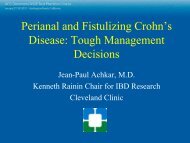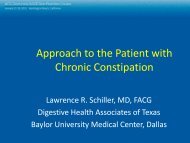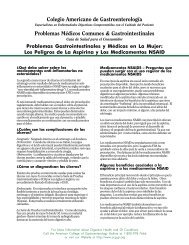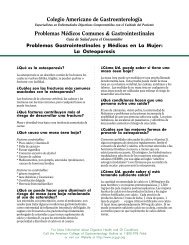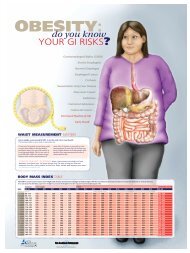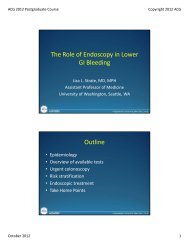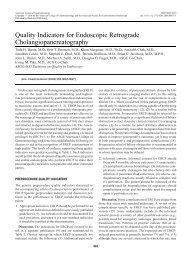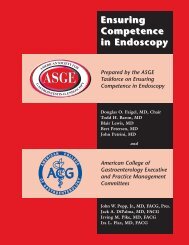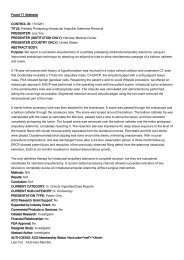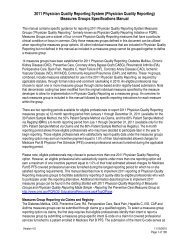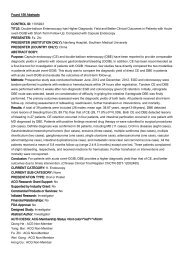Pregnancy
Pregnancy
Pregnancy
Create successful ePaper yourself
Turn your PDF publications into a flip-book with our unique Google optimized e-Paper software.
Liver Diseases in <strong>Pregnancy</strong><br />
................................................................................................................................................................<br />
reported. Management consists for the most part in<br />
surgical repair although angiographic hepatic arterial<br />
embolization and liver transplantation were successful<br />
in case reports.<br />
Intercurrent Liver Diseases in <strong>Pregnancy</strong><br />
Viral Hepatitis:<br />
Acute viral hepatits is the most common cause of jaundice<br />
in pregnancy averaging 1-2/1000. The outcome is<br />
usually benign except in viral hepatitis E and Herpes<br />
Simplex hepatitis. While infections with viral hepatitides<br />
in pregnancy may not always affect the outcome<br />
of the pregnancy, transmission to the newborn is always<br />
a concern as will be discussed below. Diagnosis<br />
of viral hepatitis in pregnancy is not different from<br />
the diagnosis in the non pregnant state and will not be<br />
discussed in full detail in this chapter.<br />
Hepatitis A virus infection (HAV)<br />
Acute hepatitis A in pregnancy is self limited and maternal<br />
fetal transmission is very rare and only reported<br />
in a few cases. 19 Transmission may occur if delivery<br />
takes place during the incubation period because of viral<br />
shedding and contamination during vaginal delivery.<br />
The risk of premature labor may be increased in<br />
women who are seriously ill during the third trimester.<br />
Treatment is supportive. IgG antibodies to HAV infection<br />
are passively transmitted to the newborn, which<br />
may lead to protection of the infant in the first several<br />
months of life. The Advisory Committee on Immunization<br />
Practices recommends vaccination of all children<br />
starting at the age of 12 months. 20 The hepatitis A<br />
vaccine is produced from inactivated HA virus. There<br />
is no evidence of risk to the fetus, the mother or the infant<br />
from vaccinating pregnant or breastfeeding mothers<br />
with inactivated virus. Pregnant women traveling<br />
to highly endemic areas for Hepatitis A may receive<br />
Hepatitis A vaccine and hepatitis A immunoglobulin<br />
for urgent prophylaxis.<br />
Hepatitis B virus infection (HBV)<br />
If acute hepatitis B occurs during pregnancy, the outcome<br />
of the pregnancy is no different from the non<br />
pregnant state. A major concern is the transmission of<br />
hepatitis B to the fetus. It is highest and on the order<br />
of 90% when the mother is positive for hepatitis B<br />
envelope antigen (HBeAg), has high viral deoxyribonucleic<br />
acid (DNA) levels or when maternal infection<br />
occurs in the third trimester. Rates of transmission average<br />
10% when e Ag is negative or maternal infection<br />
occurs in the first trimester. Perinatal and early<br />
childhood contaminations as a result of the stability of<br />
HBV in the environment could result in an estimated<br />
30%-40% of chronic infections. HBV is viable for<br />
more than 7 days at room temperature on environmental<br />
surfaces and at concentrations as low as 10 2-3 virions/ml<br />
even in the absence of visible blood. Children<br />
chronically infected with HBV are at risk of developing<br />
hepatocellular carcinoma, chronic liver disease<br />
and death.<br />
The CDC recommends<br />
screening all pregnant women<br />
for hepatitis B surface antigen<br />
HBsAg and administration<br />
of hepatitis B vaccine to all<br />
newborns.<br />
The CDC recommends screening all pregnant women<br />
for hepatitis B surface antigen HBsAg and administration<br />
of hepatitis B vaccine to all newborns. If mother<br />
is HBsAg positive, their newborns should receive<br />
hepatitis B immunoglobulin HBIG and begin hepatitis<br />
B vaccination series within the first 12 hours of birth.<br />
For all other newborns, the first dose of vaccine should<br />
be given within one month of birth and the vaccine series<br />
completed within the first 6 months of life. 21<br />
HBV vaccine derives from inactivated virus and limited<br />
data indicate no apparent risk for adverse events<br />
in the developing fetus when administered to pregnant<br />
women or breastfeeding mothers. Pregnant women<br />
should be vaccinated if at risk for exposure. Although<br />
hepatitis B surface antigen (HbsAg) may be secreted<br />
...................................................................................................................................................................................<br />
39



